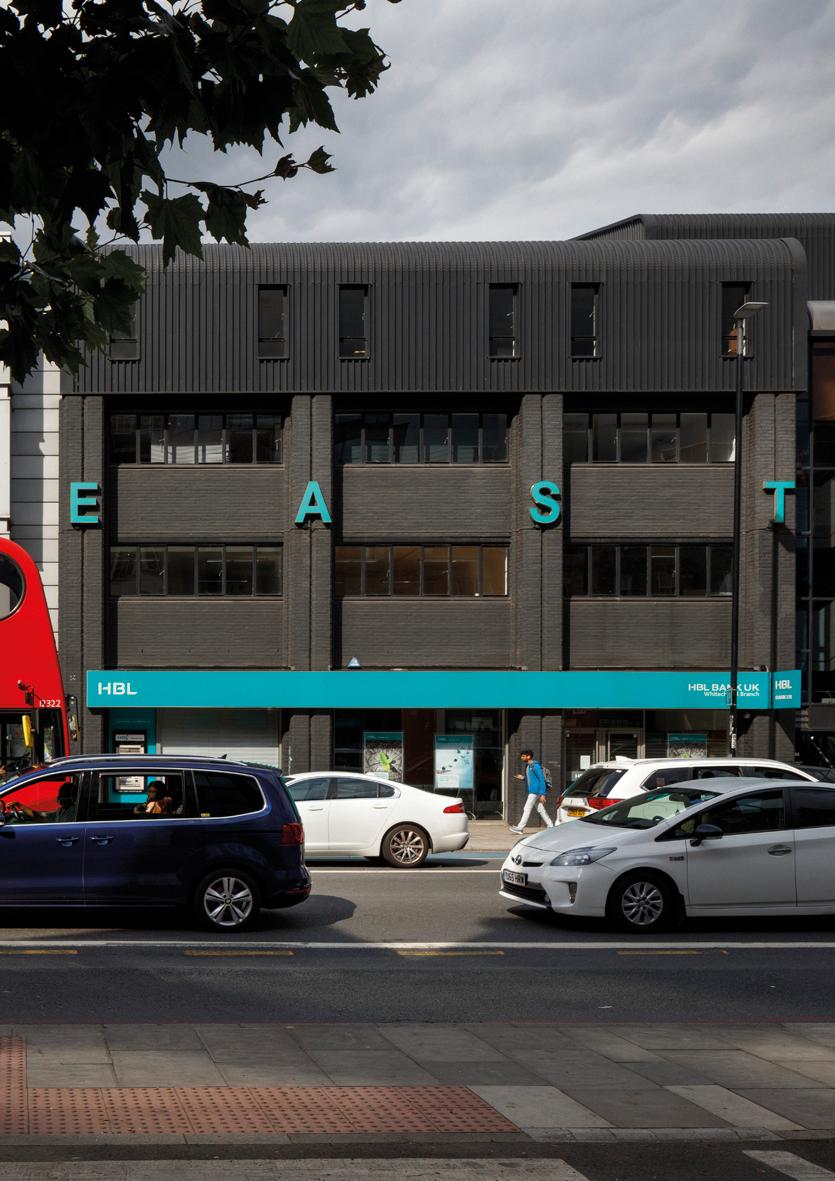
2023–2024
for healthy East London lives
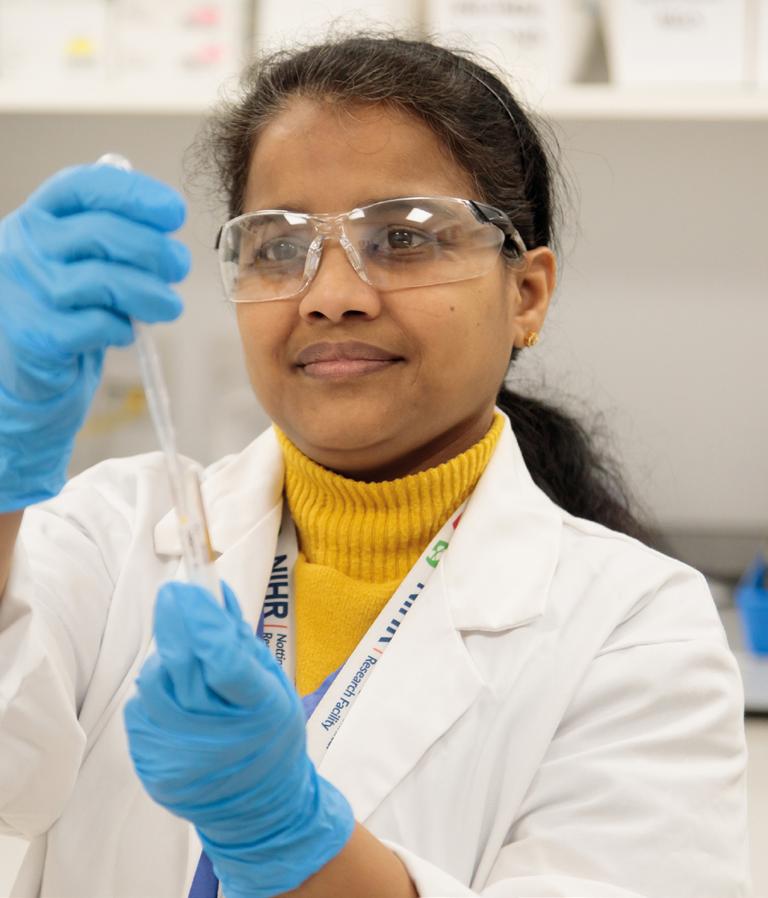




2023–2024
for healthy East London lives



As East London’s oldest healthcare charity, we’ve been at the forefront of advancing healthcare for hundreds of years. The hospitals we support strive to provide excellent care to their patients. Yet too many people’s lives in East London are affected by ill health.
Our vision
To enable life-changing improvements to health for the people of East London.
Our mission
A charity with its roots in East London, dedicated to supporting improvements to healthcare and transformative research for local health benefit.
We work in partnership with the NHS, local research institutes and others who can help us achieve our goals and maximise our impact.
As the dedicated charity for Barts Health NHS Trust, we support St Bartholomew’s, Whipps Cross, Newham, The Royal London, and Mile End hospitals. We’re also partnered with the Faculty of Medicine and Dentistry at Queen Mary University of London and the School of Health & Psychological Sciences at City St George’s (formerly City, University of London) where we fund world-leading medical research.
Together with our partners and supporters we make better healthcare possible. We invest in inspiring people and projects that have the greatest impact on the health and lives of local people.
And as our local community is one of the most diverse places to call home, what makes a difference in East London has the potential to touch lives across the world.
At Barts Charity, we’re dedicated to improving healthcare and supporting research that will benefit all of our East London community. Our latest impact report highlights the people and projects that are making a difference now, and that will shape healthcare for years to come.
This has been another big year for our funding, with £33.1m being invested in healthcare and research. This was split between our three partners: Barts Health NHS Trust (Barts Health); the Faculty of Medicine and Dentistry at Queen Mary University of London (Queen Mary); and the School of Health & Psychological Sciences at City St George’s, University of London (City St George’s).
We are thrilled to highlight the impact of our funding in the last financial year. This includes:
• expanding a successful robotic surgery programme at Barts Health with £7.6m in funding. This programme has benefitted over 3,000 patients since our original funding in 2017 and the cutting-edge, less invasive surgery is aiding shorter recovery times for patients with more conditions than ever before (page 18)
• funding of £3.2m for a collaboration between Queen Mary and Barts Health, bringing together genetics and Artificial Intelligence (AI) experts to detect conditions early by studying chemical tags’ on DNA through simple blood tests (page 8)
• research on the long-lasting impact of acute respiratory infections, such as colds (page 15)
• a successful staff recognition programme at Barts Health (page 23)
• research which has shown how a common heart attack drug may not be effective in people from South Asian backgrounds, highlighting the need for personalised treatment (page 12)
• continued investment in small changes that have a big impact, like providing specialist wheelchairs for amputees at The Royal London Hospital, allowing patients to leave the ward and see family and friends (page 24)
Last year also saw the Barts 900 campaign, an exciting moment in our history, coinciding with the 900th anniversary of St Bartholomew’s Hospital. Our goal was to develop two landmark projects in East London: a Clinical Research Facility at The Royal London Hospital and new breast cancer facilities at St Bartholomew’s Hospital. We reflect upon this significant milestone and give thanks to our supporters (page 26)
We would like to say a big thank you to our donors and supporters whose contributions continue to make the impact we achieve possible. You can find a list of our incredible philanthropists, trusts and foundations, and corporate supporters on page 30

Fiona Miller Smith Chief Executive Officer
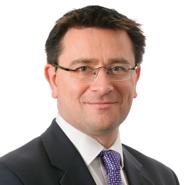
Bruce Chair of Trustees
We gave £33.1m in funding to support research and healthcare in East London.
£0.5m
School of Health & Psychological Sciences at City, University of London (now City St George’s)
£11.4m
Faculty of Medicine and Dentistry at Queen Mary University of London
£21.2m
£33.1m
Through our funding we supported:
67 grants for healthcare improvement initiatives in East London
61 grants for world-leading medical research
484 scientific publications published
17 new pieces of vital medical equipment
7 training fellowships for healthcare professionals to undertake a PhD
8 improved spaces for patients and carers
Our fundraisers raise almost £100,000 for Barts Charity by taking part in the London Landmarks Half Marathon and the London Marathon.
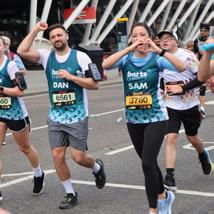
We commit to fund £648,000 to develop tailored care for unaccompanied asylumseeking young people across four boroughs in East London (page 16)
August 2023
A genetic study, funded by Barts Charity, shows that a common medication used to prevent heart attacks may be ineffective for the majority of people from South Asian backgrounds (page 12)
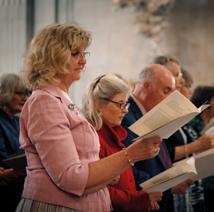
We welcome 1,500 guests to the annual View Day, which was held at St Paul’s Cathedral and celebrated the 900th anniversary of St Bartholomew’s Hospital.
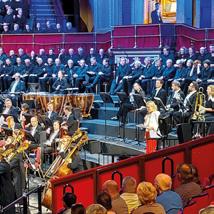
Barts Choir perform at the Royal Albert Hall and raise nearly £3,500 in support of the Barts 900 Campaign.
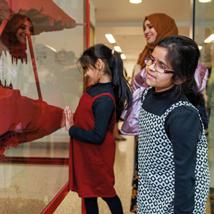
September
With our funding, a beautiful new sculpture at The Royal London Hospital honours the amazing people who have saved the lives of others through organ donation.
226 supporters take part in our first ever Hike for Health walking event and raise nearly £47,000.
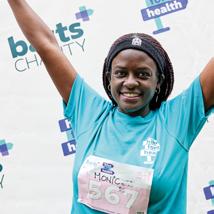
Researcher Professor Edel O’Toole, who has been funded by Barts Charity, is awarded the triennial Moxon Medal by the Royal College of Physicians. She’s the first woman to receive the Moxon Medal since it was first awarded in 1891.
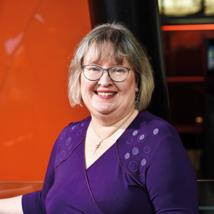
The annual Barts Health Heroes Awards, funded by Barts Charity, celebrates staff who have gone above and beyond in their work supporting patients and colleagues (page 23)

Amanjit Jhund, CEO of Whipps Cross Hospital, welcomes Barts Charity Trustees to learn how our funding is making a difference to East London lives.
We receive two incredible £1m gifts from The Charles Wolfson Charitable Trust and The Wolfson Foundation to support the development of a new Clinical Research Facility at The Royal London Hospital (page 28)
The REAL-HEALTH team at Queen Mary, funded by Barts Charity, show that school-age girls with obesity are more likely to experience joint and muscle pain. The news receives national coverage including in The Guardian, the Daily Mail and Nursing Times.
We’re transforming the health of our East London community. We do this through investments in innovative health-related research. Here are just a few highlights of our research funding from the last year.
£13m funding awarded
61 research projects funded
£135m further funding leveraged from other funders to do more research
7 fellowships awarded for healthcare professionals to train in research
484 scientific papers published
5 PhD students funded to join research groups at Queen Mary
We awarded £3.2m to a collaboration between Queen Mary and Barts Health that will bring together experts in genetics and Artificial Intelligence (AI). They’ll explore whether it’s possible to detect a range of conditions earlier by studying chemical tags’ on DNA that are released into the blood stream by dying cells. This could be done using a simple blood test.
This kind of genetic information, known as epigenetics, has the immense potential to predict someone’s risk of disease and help it be detected early. It could be used across a wide range of conditions. This includes cardiovascular conditions, kidney and liver disease, and cancer. It could also help spot health conditions associated with ageing and pregnancy.
An early aim of the project is to study epigenetic tags’ on the DNA in the blood stream that are associated with pregnancy complications, such as pre-eclampsia. This is a complication, which is disproportionately experienced by women in East London, that can lead to baby loss.
Over half of people with ovarian cancer are diagnosed at a late stage when their chances of surviving are lower. There’s currently no effective way of screening for the disease, which would help to diagnose it earlier. High levels of a molecule called CA-125 in the blood could be an early sign of cancer, but detecting this hasn’t yet been shown to save lives.
We have committed to fund Professor Ranjit Manchanda at the Wolfson Institute of Population Health, Queen Mary to study this further. Ranjit aims to find out if studying multiple different molecules or markers that may indicate early signs of ovarian cancer, and combining this information with a problem-solving AI technique, works better than just looking at CA-125 levels alone.
This could provide the early data the team needs to set up a large trial to test how effective this technique would be as a screening approach for ovarian cancer. Potentially, it could lead to earlier diagnosis and save lives.
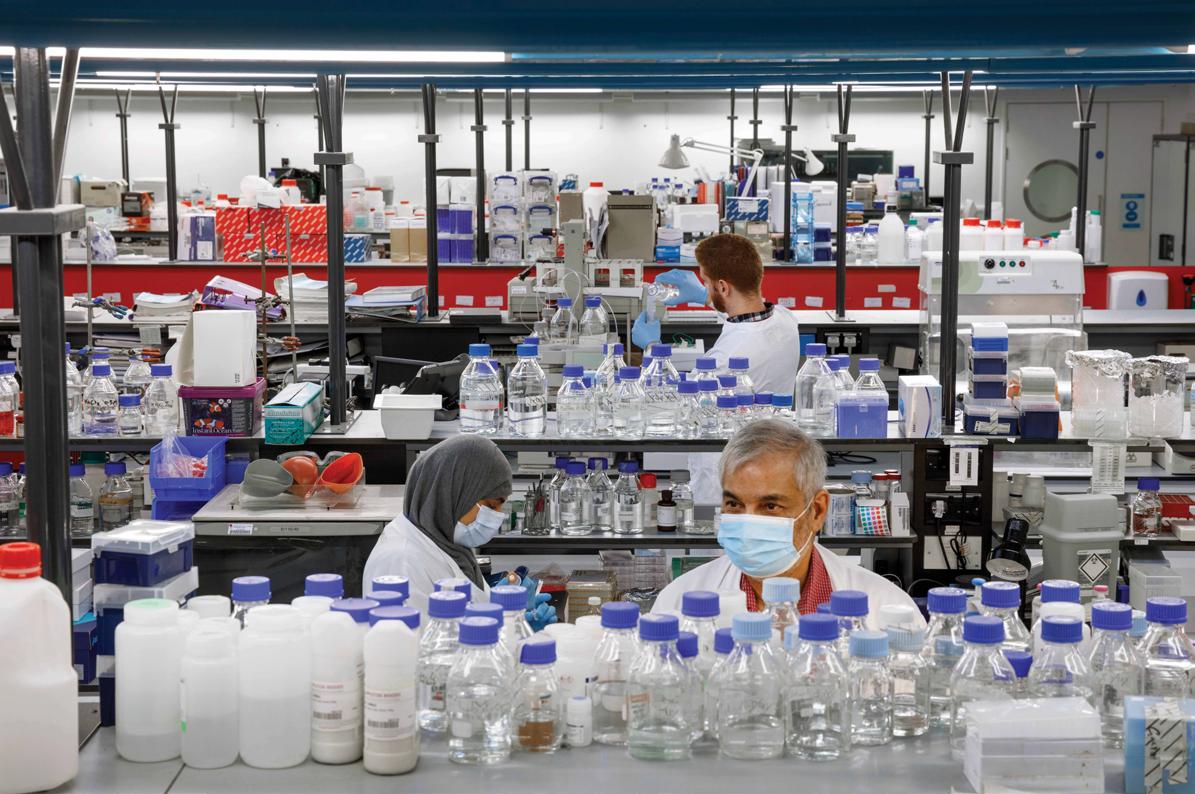
Some children and young people experience movements they cannot control, known as hyperkinetic movement disorders. This can be caused by several conditions, such as cerebral palsy. Researchers often use different ways to measure how people with the condition improve, which means it’s hard to know whether treatment is making a difference.
We awarded £75,000 to Dr Hortensia Gimeno at the Wolfson Institute of Population Health, Queen Mary, to discover how to best measure this condition. Hortensia will summarise existing research, and speak to parents, carers, children and young people, doctors and therapists.
She will share her findings with families and professionals to raise awareness of the best interventions and how they help. Hortensia will then use the results to develop a more in-depth study to explore what areas matter most to people with these conditions. This could improve care for children and families and guide future interventions.
Long QT syndrome is an inherited heart condition that increases someone’s risk of dying suddenly. Patients with the syndrome are monitored using an electrocardiogram – a simple test to record the heart’s electrical activity – to help doctors make decisions about their treatment. Patients need to attend clinics regularly to have tests, which can be disruptive to their lives.
We awarded £35,500 to Dr William Young at the William Harvey Research Institute, Queen Mary, to test whether a wearable device that tracks physical activity is as accurate as the standard electrocardiogram. The study will involve 80 patients with long QT syndrome who will wear the device on their wrist, like a watch, to track their heart rate for three months.
If the team shows the device works well, this could mean patients can be monitored from home in the future. This will mean fewer hospital visits for patients, and earlier detection of the signs of dangerous heart rhythms.
We know that patients who are treated in hospitals that carry out research have a more positive experience and greater trust in staff. They also have better treatment outcomes and survival rates.
At the same time, healthcare professionals are close to the problems that matter to their patients. They can undertake research that answers patients’ questions and improves their lives.
This is why we’re helping to increase the number of local healthcare professionals working on patient-focused research that could improve the lives of people in East London. We’re doing this by offering an enhanced range of research training opportunities.

Elen Williams, General Practitioner
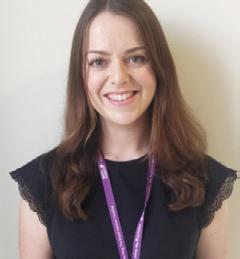
Kelly, Speech and Language Therapist
Our PhD research training programme is open to professionals working in different areas of healthcare, including physiotherapists, psychologists, nurses and doctors.
This year we committed to fund seven new fellowships for healthcare professionals to undertake a PhD. Here are two of our inspiring new fellows:
Dr Elen Williams is a General Practitioner (GP) in Tower Hamlets. Elen is researching ways to improve how we identify and treat long-term pain in people with severe mental illness. This could improve care at GP practices and help more people get the treatment they need.
Eileen Kelly is a speech and language therapist at The Royal London Hospital. Eileen wants to find out if a treatment that uses electrical impulses to stimulate muscles could help with swallowing. People in intensive care may have trouble swallowing because they lose muscle function in their mouths and throats. If Eileen’s treatment works, it could help patients to eat and drink safely, speeding up their recovery.
Dr Tracey Bowden joined St Bartholomew’s Hospital as a cardiac nurse in 1998. Tracey joined City, University of London (now City St George’s) as an academic in 2005 where she now works as a Senior Lecturer in Cardiac Care and Adult Nursing. At the same time, Tracey continues to teach cardiac courses for nurses at St Bartholomew’s Hospital. She was awarded a Barts Charity PhD fellowship in 2019, which she successfully completed in 2023.
Tracey’s fellowship explored whether using a brain training programme could improve people’s memory and learning after they have heart surgery. This is something that patients often struggle with. The programme has been tested with many groups of people, for example, with older people. But little has been done with heart patients. Tracey’s study was the first time anyone looked at using this intervention in UK patients who’ve had heart surgery.
What inspired you to apply for a Barts Charity fellowship?
I joined St Bartholomew’s Hospital in 1998 shortly after qualifying as a nurse, so I have strong affiliations with Barts Health and East London. I had always been interested in research, so applying to the Barts Charity fellowship made sense. It enabled me to fully immerse myself in research and work on that full time.
did your fellowship help you to achieve?
I published a small study showing that brain training exercises could work well and are acceptable to cardiac patients. My hope now is to go and get more funding for a bigger study. I presented my work at the Society for Cardiothoracic Surgery, where I was awarded the Best Nursing and Allied Health Professional Presentation. I’ve also been able to join international research networks and develop many connections and collaborations.
What impact could your research have on patients?
Doing simple brain training exercises each day is not too intrusive, and a lot of my patients found it fun. By working with my patient involvement group, I’ve started to think about how to modify the programme to be inclusive of neurodiverse patients too. If I can get funding for a bigger study to prove that the exercises help, they could provide a safe and cost-effective way of improving memory and learning for many patients after heart surgery.

For doctors, nurses and allied health professionals with PhDs in research, there are few opportunities to progress into research leadership roles. Without these opportunities, many professionals have to stop doing research altogether.
We awarded £1.1m to Queen Mary, in collaboration with Barts Health, to create eight Academic Clinical Lecturer posts for a career development academy, called Barts Precision Medicine Academy. There will be four posts for doctors and four for nurses and allied health professionals. This will allow healthcare professionals to carry out
precision or personalised medicine research that includes finding better ways to predict health risks, preventing ill health and tailoring treatments for patients.
The Academy will strengthen the clinical academic workforce locally at Barts Health and Queen Mary, ultimately leading to better outcomes and experiences for patients in East London.
People from South Asian backgrounds have a higher risk of heart disease. However, research we’ve funded has shown that a commonly prescribed drug for preventing heart attacks may be ineffective for some people from South Asian backgrounds, compared to people of European ancestry.
Dr Emma Magavern is a medical doctor and researcher at the William Harvey Research Institute at Queen Mary and Barts Heart Centre. In 2023, she published several high-profile scientific papers, including Barts Charity-funded work. One area of her research showed that a common heart medication, called clopidogrel, may be less effective in people from South Asian backgrounds. This research highlights the importance of personalising treatments to patients and better representing diverse groups of people when we develop drugs.
Studies of European populations show that around a third of people have changes in their genes that make clopidogrel less effective. However, researchers have not looked for these changes in people from South Asian backgrounds who live in the UK.
Emma and her colleagues examined the health data of over 44,000 people who have a Bangladeshi and Pakistani background participating in a longterm study called Genes & Health. They found that 57% of participants have the common genetic change that makes clopidogrel less effective. Yet most of the participants who had already had a heart attack, had received this drug.
When the researchers looked at the participants’ long-term health, they found that people with these genetic changes were over three times more likely to have repeated heart attacks.
Understanding the genetic differences between people is key to making sure that everyone has equal access to effective treatments. Genetic testing could soon become available within the NHS to find out if patients would benefit from clopidogrel. The information could be used to find the most effective medicine and reduce the risk of further heart attacks.
For this to happen, it would be important to educate the public about genetic testing, particularly those from historically underrepresented ethnic groups.
Emma held a series of focus groups with people from East London’s South Asian community to better understand their perspectives. She identified that trust was the most important factor for encouraging people to engage with genetic testing. GPs were seen as trustworthy medical professionals who could invite people to take part in genetic testing, either for research or to make sure their medications were personalised.
Emma’s work could help make genetic testing possible in routine clinical care so doctors can find the best treatment for patients after a heart attack. In particular, she hopes that this will improve health equality for people from South Asian backgrounds.
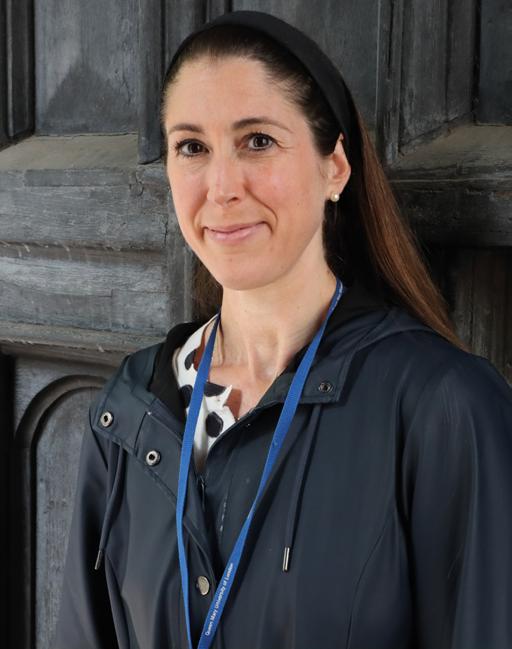
Emma’s work was made possible by Barts Charity awarding over £10m to support the creation of the Barts Heart Centre at St Bartholomew’s Hospital in 2015. Part of that award was used to fund talented researchers, like Emma, to carry out patientfocused research for the benefit of our diverse East London population.
“With Barts Charity funding, I’ve been able to focus my work on our under-represented patient demographic in East London and highlight the importance of a more inclusive approach to drug development, particularly for people of Bangladeshi and Pakistani ancestry.”
Dr Emma Magavern, lead researcher and clinician, Queen Mary
• In 2022, researchers develop the first test to detect deadly heart inflammation, which could soon be available in GP surgeries and save thousands of lives every year.
• In 2022, the Cardiovascular Devices Hub opens, thanks to a generous gift from the Charles Wolfson Charitable Trust. The Hub capitalises on the incredible expertise at the centre to develop new devices to treat heart disease.
• In 2023, a team becomes the first in the UK to use an implant to treat aortic regurgitation – a condition where blood doesn’t flow correctly out of the heart and leaks backwards.
• In 2023, surgeons use a robot to successfully operate on a beating heart for the very first time in the UK.
Laughing gas, or nitrous oxide, is one of the most commonly used recreational drugs by 16 to 24-yearolds and can cause long-term damage to the nervous system. There has been a surge in cases of spinal cord damage caused by laughing gas in East London. This is why our researchers have published the first national guidelines to improve how this kind of spinal cord damage is diagnosed and treated.
Recreational use of laughing gas can damage the spinal cord, causing permanent disability. Many patients who come to hospital with this condition can’t walk, have fallen and experience tingling or a loss of sensation in their feet and hands.
Spinal cord damage caused by laughing gas can be treated if it’s recognised early, but it’s commonly misdiagnosed. There have been no agreed treatment guidelines, meaning there was poor awareness of the condition among healthcare professionals.
Researchers from the Centre for Preventive Neurology at Queen Mary have led pioneering work to understand the neurological harms of using laughing gas recreationally.
In 2023, the team developed local guidelines to improve how patients at Barts Health were managed for this. Doctors there were seeing more than one case every week.
Now, the guidelines have been endorsed by the Association of British Neurologists. They are benefiting patients by raising health professionals’ awareness of the harms of laughing gas use and standardising clinical management across the UK.

“Thanks to early Barts Charity funding to form the Preventive Neurology Unit, we’ve piloted important work on the neurological harms of recreational nitrous oxide use. We’ve developed nationally endorsed guidelines which will help young people for years to come.”
Professor Alastair Noyce, Professor of Neurology and Neuroepidemiology, Queen Mary and Consultant Neurologist, Barts Health
This work is thanks to our £1.5m investment in 2017 to establish a Preventive Neurology Unit at Queen Mary to research brain and nervous system disorders in diverse populations. Since then, the unit has expanded significantly. The team have published over 300 scientific papers and attracted a year-on-year increase in investment from major UK funders.
In September 2023, the unit’s incredible work was recognised when it officially became a Centre for Preventive Neurology – the only centre of its kind in the UK.
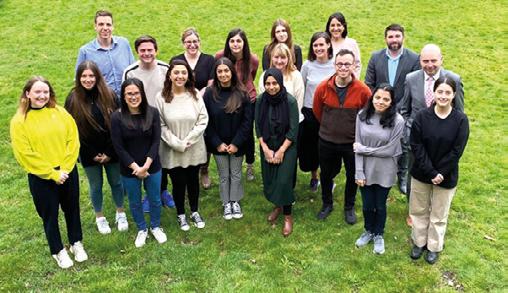
Long Covid is now a recognised condition. But there have been few studies looking at long-term symptoms following other respiratory infections, such as colds. Last year, our researchers discovered that long colds’ exist, highlighting the need for more research into the long-lasting impact of respiratory infections.
In 2020, in response to the Covid-19 pandemic, we swiftly awarded £126,000 to Professor Adrian Martineau at the Blizard Institute, Queen Mary, for the COVIDENCE UK study. It aims to better understand the risk factors and effects of Covid-19.
In 2023, the team published important work comparing long-term symptoms after Covid-19 with people who had other respiratory infections, including colds and flu.
The study analysed data from over 10,000 adults in the UK in the first two months of 2021, when the Covid-19 pandemic was entering its second year.
The team found that common symptoms of long colds’ included coughing, stomach pain and diarrhoea. These could still be present four weeks after someone had become infected. Those recovering from Covid-19 were more likely to experience light-headedness or dizziness, and problems with taste and smell, compared to those who had a non-Covid-19 respiratory infection.
The severity of the original illness appears to be a key driver in the risk of long-term symptoms. But more research is being carried out to find out why some people suffer extended symptoms, and others don’t.
Findings from the study received widespread national and international media coverage including through The Guardian, BBC News, The Times and CNBC News, reaching approximately 500m people worldwide. This helps to promote research among scientists and raises awareness with the public and policymakers.
Studies like this are building greater awareness around other prolonged respiratory infections that may be going unrecognised. This could help doctors to better diagnose and treat these conditions in the future.

“We would not have been able to undertake this crucial study without the timely support of Barts Charity during the early days of the Covid-19 pandemic. Now, we’re continuing to make discoveries that could help us identify the best care for people suffering the longterm effects of a wide range of respiratory infections.”
Professor Adrian Martineau, Clinical Professor of Respiratory Infection and Immunity, Queen Mary
We invest in innovative improvements to healthcare. By working with Barts Health and staff at its five hospitals, we bring brilliant ideas to life, improving health and healthcare for our East London community. Here are just a few highlights of healthcare funding we have awarded in the last year.
£17m healthcare funding awarded
8 improved spaces for families, patients and carers
7 new pieces of vital medical equipment
67 grants awarded
4 community engagement projects
The pathway addresses young people’s physical, and emotional health needs. This includes screening for infectious disease and signposting to sexual health services. It also offers follow-up appointments with clinicians who specialise in children and young people’s mental health.
The team will collect evidence that could help the care pathway be introduced across the UK.

When unaccompanied asylum-seeking young people arrive in the UK, many have experienced significant trauma, including sexual violence. Many have both mental and physical health needs. To help provide the crucial support they need, we have committed £648,000 in funding to establish a trauma-informed pathway of care across four boroughs in East London. This has been generously supported with a £100,000 grant from City Bridge Foundation – London’s biggest independent charity funder.
We have committed £450,000 in funding to help bring a tailored social prescribing service to cardiac patients. Working alongside teams in Barts Heart Centre and the Bromley by Bow Centre, social prescribing provides non-medical, holistic support to help patients with their physical and mental wellbeing – key lifestyle factors in improving heart health. This is done through a Community Connector.
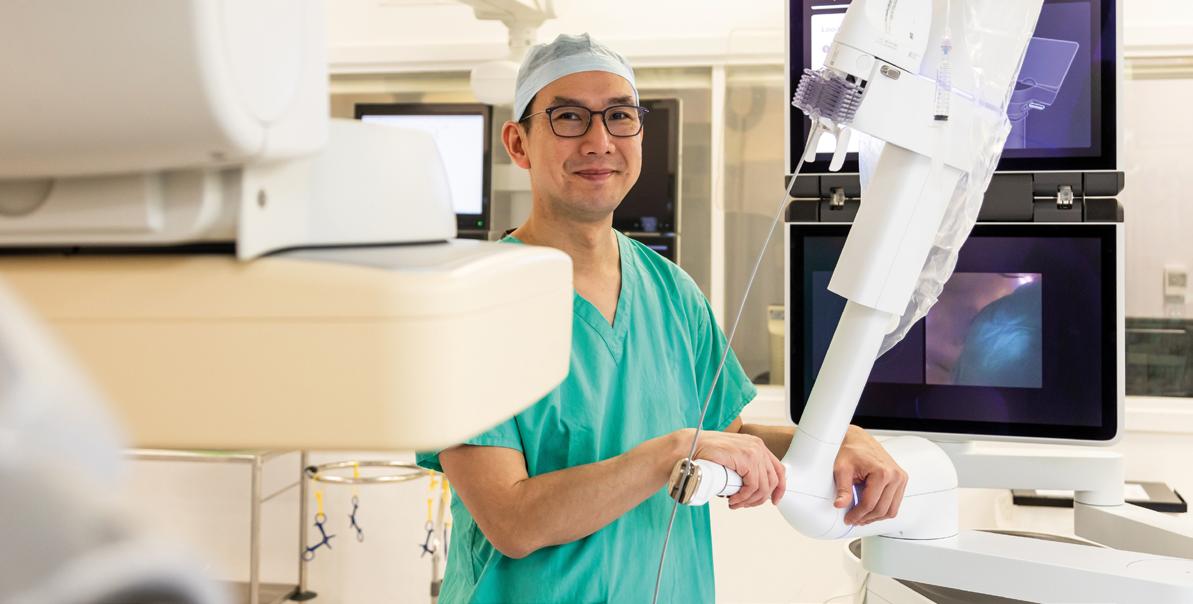
Mr Kelvin Lau, Consultant Thoracic surgeon who led the robotic bronchoscopy project.
The Community Connector works with patients to address employment, housing and access to affordable, nutritious food. These are concerns that many patients treated in the Barts Heart Centre experience. They will also connect patients to clubs and services in their local community.
Over the next three years, the service aims to support nearly 1,000 people in the Tower Hamlets area.
Lung cancer is the most common cause of cancer death in the UK, partly because almost 70% of cases are diagnosed at a late stage. When small nodules are detected in the lungs, a health professional will perform a bronchoscopy, a test to look inside the airways in your lungs through a thin tube. It collects samples of the nodules to find out if they’re cancerous.
We awarded £570,000 to St Bartholomew’s Hospital to introduce the UK’s first roboticassisted bronchoscopy service for patients from East London and Essex. Robotic bronchoscopy provides a safer, less invasive and more accurate diagnosis of lung cancer than traditional bronchoscopy. The new service will help patients get quicker diagnoses and treatment, giving them a better chance of survival.
In the borough of Tower Hamlets, nearly 35% of residents are from a Bangladeshi background. Almost half of people who use stroke service in the area are Bengali or Sylheti speakers.
That’s why we awarded £49,000 to fund a Bengali and Sylheti speaking member of staff at The Royal London Hospital. The Therapy Link Worker will help stroke survivors and their families access the support they need.
They will provide spoken and written information to support people to recover from stroke, help design culturally appropriate assessments, and work with the community to increase understanding of strokes and ways of preventing them.
Uterine fibroids, non-cancerous tumours in the uterus, are a common issue in women’s health. They can be incredibly painful, and traditional surgical treatments often involve a long recovery time for patients.
We awarded £47,000 to support a 12-month pilot at Whipps Cross Hospital for fibroid ablation. This is a less invasive type of surgery which can improve recovery times and mean fewer complications. The team will collect evidence on the benefits of using this treatment, which is already available to women in other parts of the UK. The evidence will support future investment in the treatment.
Surgeons use robots to perform a growing number of complex surgical procedures in the NHS. In contrast to other surgeries, robotic surgery is less invasive and extremely precise. This often makes recovery much quicker, with many patients able to leave hospital the same day as their surgery.
In 2017, Barts Charity awarded £5.2m to Barts Health to launch its robotic surgery programme. This funding paid for two robots – one at St Bartholomew’s Hospital and the other at The Royal London Hospital. Since they were introduced in 2018, more than 3,000 patients have benefitted from robotic surgery, and teams have built an international reputation for these procedures.
This year, we have invested £7.6m to bring three additional robots to Barts Health hospitals. This includes one each to St Bartholomew’s Hospital and The Royal London Hospital and – for the first time – one to Whipps Cross Hospital. Not only will more patients in our East London community benefit, but patients from further afield in London and beyond will be referred for robotic surgery at these hospitals. In some cases, patients may be referred from across England.
The expansion of the robotic surgery programme will allow Barts Health to continue improving healthcare equity for the people of East London.
In 2018, St Bartholomew’s Hospital established a robotic programme for thoracic (chest) surgery. Since then, over 1,700 patients have been treated on the programme, with the proportion of patients receiving less invasive surgery increasing from 60% to 95%. The team has built an international reputation in robotic thoracic surgery, offering specialist training programmes for surgeons from around the world.
With the addition of a new robot, more patients have access to this successful programme. It has established cardiac robotic surgery service at St Bartholomew’s Hospital – the only centre in the UK. This has been generously supported by a donation made in memory of Vahab Samadian.
In 2022, we supported training that has laid the groundwork for the cardiac robotic surgery programme at St Bartholomew’s Hospital. This has been generously supported by a donation from The Alamouti Family.
With our funding, The Royal London Hospital introduced a multidisciplinary robotic surgery programme. This has helped patients in gynaecology oncology (cancers that start in the female reproductive system), urology, ear nose and throat (ENT) and hepatobiliary (the liver, gallbladder and bile duct).
Since then, the gynaecology–oncology team has been able to significantly increase the number of patients with obesity and morbid obesity undergoing minimally invasive surgery. They achieved this after showing that there is no difference in the length of stay, or frequency and severity of complication rates between patients with obesity, morbid obesity and non-obesity who have robotic surgery for gynaecology–oncology.
The addition of a new robot has brought the benefits of robotic surgery to even more patients.
• benefitted more than 3,000 people
• increased the proportion of people receiving minimally invasive thoracic surgery from 60% to 95% at St Bartholomew’s Hospital
• established cardiac robotic surgery at St Bartholomew’s Hospital – the only service of its kind in the UK.
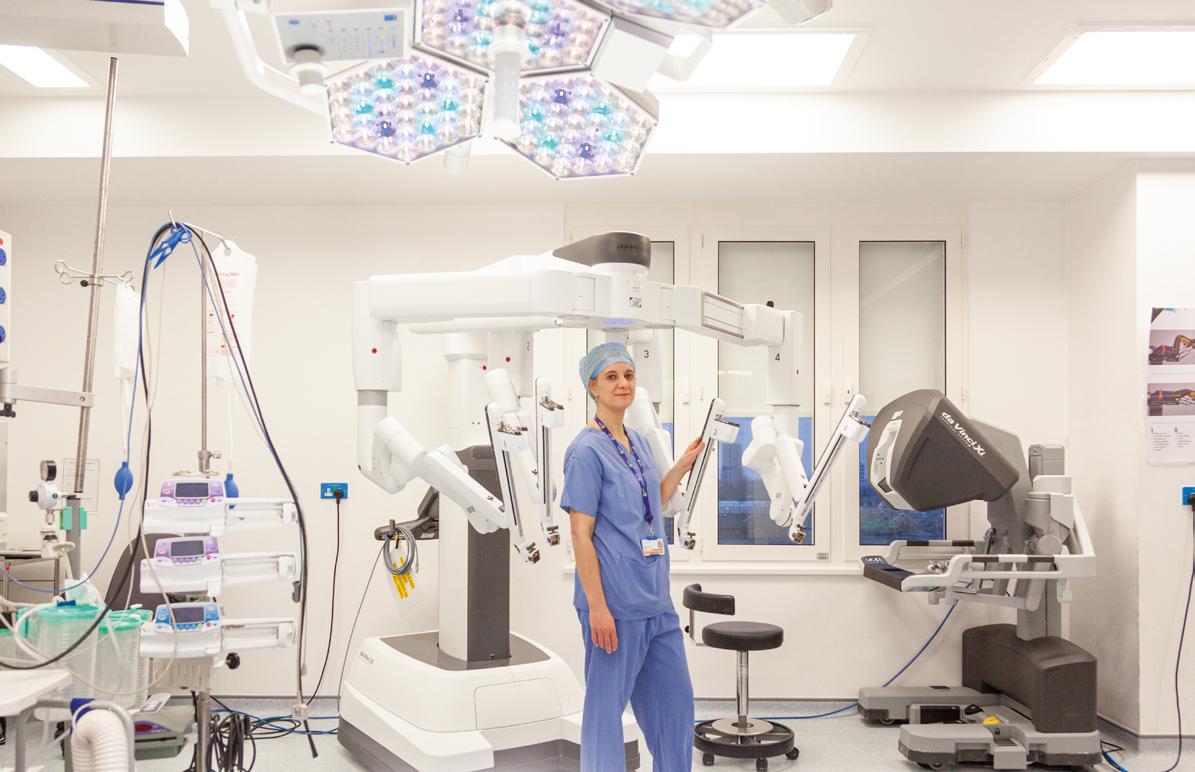
With the funding we have made this year, Whipps Cross Hospital has introduced robotic surgery for the first time. Teams can now deliver robotic surgery for a range of conditions, including gynaecology, urology and colorectal cancer.
In recent years, the demand for gynaecological services has grown. Whipps Cross has developed an international reputation for addressing diversity in women’s healthcare and is now poised to improve equitable access to the communities it serves.
The first robot at Whipps Cross Hospital is being used with gynaecology patients, as well as for general surgery, specifically colorectal cancer.
“It’s so important for there to be more awareness about robotic surgery, and what it can do for women’s health,” says Michelle from East London When Michelle started experiencing heavy bleeding, she sought immediate help from doctors, who discovered a cancerous polyp. She was offered robotic surgery for a full hysterectomy at The Royal London Hospital. Despite being nervous at first, she was amazed with the outcome of the surgery. She experienced minimal pain after the operation and was able to go home after just 24 hours.
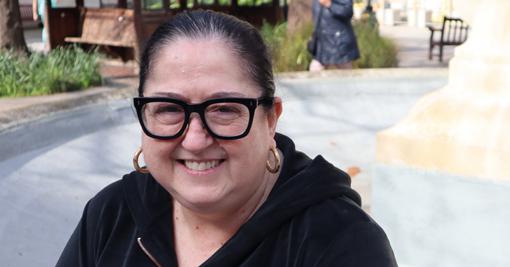
For seriously ill patients in hospital, a small deterioration in health can be fatal. Thanks to our funding, patient data can now be collected digitally at patients’ bedsides at Barts Health hospitals. It means staff can quickly detect when someone is deteriorating so rapidly that their life is in danger, freeing up time for nurses to spend critical time with patients.
Historically, important information about patients – called vital signs’ – has been recorded on paper. This includes someone’s temperature, heart rate, blood pressure, breathing rate and oxygen levels. It’s a time-consuming process which makes it difficult for staff to detect changes in unwell patients quickly.
In 2019, we awarded £630,000, supported with a gift from Fidelity, to digitise the recording of vital signs in general wards at St Bartholomew’s Hospital. Due to its early success, Barts Health then introduced the programme across the Trust.
Patient data has been used to create a reporting dashboard, which currently contains over 12 million vital signs measurements from 240,000 individual patients. The data is automatically updated every 15 minutes. It is used by critical care outreach teams to proactively identify and prioritise the care of patients whose vital signs indicate a deterioration. This is something which was simply not possible using paper records.
These dashboards allow the team to detect and treat unwell patients quickly. The system is also capable of automatically calculating the National Early Warning Score, which is used to standardise health professionals’ assessment and response to acute illness.
So far, this has led to a 20-fold increase in the number of patient escalation forms that have been completed. That means patients who are becoming seriously unwell are taken to intensive care more quickly. There has also been a 25-fold increase in patients being screened for sepsis, meaning more patients can be identified and rapidly receive the antibiotics they need.
During the peak of the Covid-19 pandemic, running out of oxygen for patients was a serious concern. As the vital signs monitor collect data related to someone’s individual oxygen levels, Barts Health was able to build a dashboard that monitors oxygen use across Barts Health hospitals. This allowed staff on wards to reduce the unnecessary use of oxygen. Doing this avoided a potentially catastrophic supply failure when levels were low during the pandemic.
In 2024, thanks to a further £4.4m award from Barts Charity, Barts Health will bring this system to the most critically ill patients in intensive care and those having operations. With over 150 surgical rooms and 180 critical care beds across Barts Health hospitals, this is estimated to benefit over 44,000 patients each year.
Introducing the system will involve integrating vital signs data, including someone’s temperature, pulse rate, blood pressure and breathing rate, with data from ventilators, anaesthetic and blood purifying machines, and patients’ electronic records.
Like on general wards, this tailored system will provide teams with almost real-time updates on a patient’s health. This will allow staff to intervene quickly when someone is very ill. The system will also free up nurses’ time which can then be spent on providing critical care for patients.
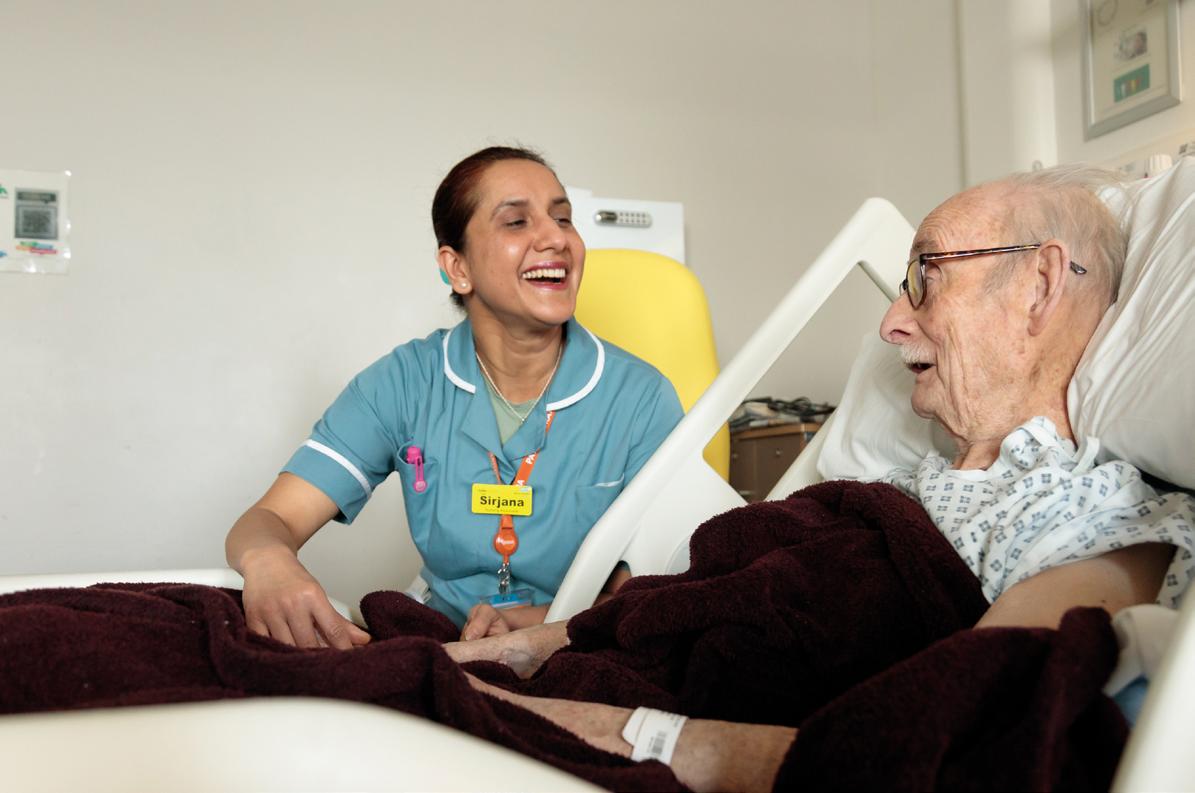
Our new funding will also allow critical care units and theatres to gather vital data on how much ventilation a patient is receiving.
Evidence shows that lower ventilation levels lead to better outcomes for patients. But lower ventilation targets are often missed. Staff in intensive care wards will use the newly available ventilator data in the electronic patient record to optimise ventilation levels in patients with severe respiratory conditions. This could help to reduce the risk of complications, including lung injury, and reduce the length of patients’ stay in hospital.
“We have shown, through our early work, that clinical data improves care and enables nurses to spend more time with their patients. The data we capture will enable clinical staff to monitor and respond to patients when they most need it, faster than before, improving how care is given and delivered. We are so grateful to Barts Charity for this support.”
Dr Dan Melley, Consultant in Intensive Care and Deputy Chief Clinical Information Officer
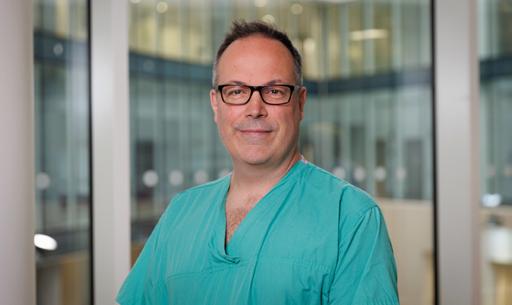
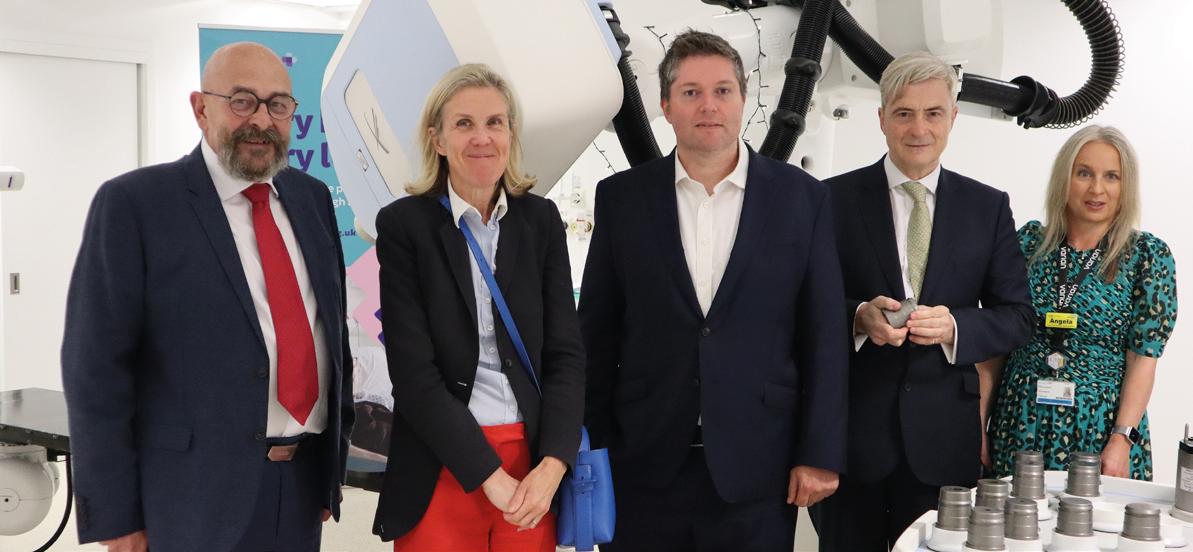
St Bartholomew’s Hospital has a long history of delivering excellent cancer care to patients in East London. Our investments in innovative technologies have transformed healthcare at the hospital and helped maintain its world-leading reputation.
In 2010, we awarded £3.1m to introduce a CyberKnife radiotherapy machine to Barts Cancer Centre at St Bartholomew’s Hospital. This was made possible thanks to a generous gift from the London Freemasons.
CyberKnife is a non-invasive, specialised machine that delivers stereotactic radiotherapy. This is a treatment that delivers high energy X-rays, from many different angles around the body to kill cancer cells and shrink tumours. The beams meet at the tumour, delivering a targeted high dose of radiation while tissues around it receive a much lower dose. This reduces the risk of side effects.
Stereotactic radiotherapy can treat extremely small tumours in the brain and spinal cord, which have limited treatment options. When we awarded the funding 14 years ago, CyberKnife was one of the most advanced radiotherapy systems available.
As one of the earliest NHS hospitals to offer stereotactic radiotherapy, the team at St Bartholomew’s Hospital quickly gained expertise.
They have become internationally recognised in the stereotactic radiotherapy field and have contributed to knowledge-sharing groups, conferences and consortia for health professionals and scientists.
In collaboration with the Barts Heart Centre, the team became the first in the UK to use stereotactic radiotherapy to treat patients with ventricular tachycardia – a condition where the heart beats too fast. This type of radiotherapy allows doctors to direct the radiation beam to make sure it stays on target as the patient breathes during surgery.
Over its lifetime, the CyberKnife treated over 1,600 patients. This year, it has reached the end of its incredible journey at St Bartholomew’s Hospital. Thanks to the visionary support of our philanthropic donors, the hospital has been at the forefront of delivering specialist stereotactic radiotherapy services in the UK for nearly 15 years. Now, the team plans to introduce the latest technology to the centre to continue their pioneering work in this field.
We understand the importance of supporting the health and wellbeing of NHS staff. Even a small recognition for the amazing work they do, day in, day out, can have a positive impact on staff wellbeing and motivation. That’s why we’re continuing to invest in rewarding and recognising staff at Barts Health.
In 2012, we supported Barts Health to introduce a series of events to recognise the hard work of its staff and volunteers.
A central part of this programme has been the Barts Health Heroes awards, where anyone can nominate staff and volunteers who have gone the extra mile. Finalists are invited to celebrate nominees and winners at the annual Barts Health Heroes awards ceremony.
The awards have been a huge success, with the most recent ceremony receiving 1,268 patient and colleague nominations over the previous 12 months.
“I was humbled, shocked and overwhelmed. It’s nice to be recognised.”
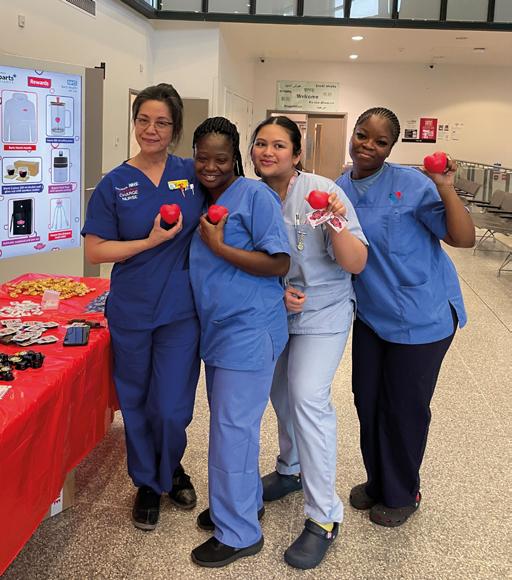
We have also funded the expansion of a new reward and recognition programme, created in consultation with over 1,600 members of staff.
Staff wanted a visible means of thanking their colleagues for their support and everyday acts of kindness. They also wanted colleagues to be recognised with small tokens of appreciation.
So, in 2024, Barts Health introduced an online recognition platform, called Barts Hearts. Staff can send a message of thanks with a heart’ to colleagues that have gone the extra mile. When staff reach a certain number of hearts’ they swap them for a small reward, such as a Bluetooth speaker or earbuds.
Over 50,000 hearts have been sent since its launch, including from staff who work out of out of hours because the platform allows 24-hour access.
The programme includes thank you cards, long service gifts and celebration of local heroes’ across hospital sites. It also provides grants to support staff to go to award ceremonies which would otherwise have been too expensive to attend.
Sometimes, a relatively straightforward and easy-toimplement change could have a big impact on the care, experience and wellbeing of patients and families. Here, you can read about how our funding helps to turn ideas from Barts Health staff into a reality.
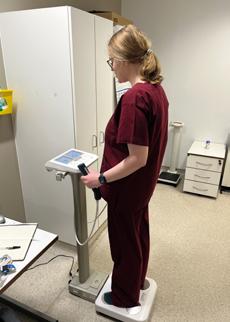
Our £7,000 funding paid for a new Bioelectrical Impedance Analysis (BIA) scale at St Bartholomew’s Hospital.
This helps dieticians to create individualised treatment plans for each cancer patient. These help patients maintain enough muscle mass to tolerate treatment and have as good quality of life as possible.

When patients are admitted to Ward 10E at The Royal London Hospital, they are at a pivotal moment in their limb loss journey. We awarded £16,000 to buy 15 new wheelchairs and 21 pressure-relief cushions to make sure patients of all body shapes and ages can adjust to their new lifestyle in a wheelchair that can perfectly meet their needs. The equipment has had a huge impact on patients’ independence, allowing them to leave the ward and see family and friends.
We awarded £25,000 to transform the Sycamore Ward’s dayroom at Whipps Cross Hospital into a calm and inviting space for older patients and their visitors. Patients now have new bedside tables, lockers and visitors’ chairs to make their stay more comfortable.
The renovation has been particularly beneficial for families to share valuable time with their loved one or have some privacy during difficult times.

With £30,000 of funding, the Neonatal Transfer Service at The Royal London Hospital were able to purchase two new CritiCool® MINI control units. These provide vital temperature control when babies are transported to intensive care for emergency treatment.
The new equipment has helped over 100 babies so far. It will continue to provide life-saving support to babies across London.
This work has been generously supported by EBM Charitable Trust.
We awarded £50,000 to Newham Hospital to provide artwork and furniture for their new building, which will house a 26-bed general ward and 14-bed Critical Care Unit.
This is particularly important for the 3,350 visitors a year who come to visit family and friends at the building. The patients they visit are often in a critical condition and visitors are often understandably anxious.
The artwork and furniture have been commissioned by the arts organisation for Barts Health, Vital Arts.

The Barts 900 Campaign ran throughout 2023 to coincide with the 900th anniversary of the founding of St Bartholomew’s Hospital. Throughout its history, St Bartholomew’s Hospital has had an extraordinary impact on millions of people, including patients and staff. Situated in the heart of London, its reach has extended nationally and internationally through its contributions to medicine, education and nursing.
To mark this unique anniversary, a number of ambitious fundraising projects were launched to bring together the Barts Health family.
Our goal was to fund two landmark projects in East London to support everyone in the area and have an impact globally – a Clinical Research Facility at The Royal London Hospital and support for world-leading breast cancer care at St Bartholomew’s Hospital.
Other projects included restoration of the historic North Wing led by Barts Heritage - a charity focussed on rescue and rejuvenation of the historic buildings of St Bartholomew’s Hospital.
The hospital’s loyal supporters also used this unique milestone to host dozens of events to celebrate, commemorate and fundraise. Their activities helped to communicate the significance of St Bartholomew’s Hospital to thousands of people.
We strengthened our relationship with the City of London, who supported a special View Day. This involved a thanksgiving service at St Paul’s Cathedral and a reception at the Guildhall.
In support of the campaign, the office of the Lord Mayor of the City of London hosted events at Mansion House by the Lord Mayor and Lady Mayoress of the City of London from 2021 to 2022, Vincent and Amanda Keavney.
The generosity continued with Sir Nicholas and Felicity Lyons, Lord Mayor and Lady Mayoress of the City of London from 2022 to 2023, hosting receptions in late October and early November 2023. This was in their private quarters at Mansion House for key supporters. Guests heard first-hand about the two transformational Barts 900 projects directly from senior project teams at Barts Health.
The Barts 900 Campaign helped to engage new community organisations in our fundraising. A great example of this has been our partnership with Barts Choir, who selected Barts Charity as their charity of the year for 2023.
This partnership raised over £7,000 and brought our charity to new audiences who follow the choir at their events. The choir performed at the Royal Albert Hall in July 2023, raising awareness of our work to the thousands of people who attended.
The success of our special year and the Barts 900 campaign was down to the support we received from the City, as well as our Trustees, Advisers and advocates. They introduced us to their networks and supported our funding applications.
As a result, in early 2024, we announced two seven figure pledges for the Clinical Research Facility, marking a huge step forward for this project. Read more about these generous donations on the next page.
Building work will begin on the Clinical Research Facility soon to make this cutting-edge centre a reality.
The legacy of the Barts 900 Campaign will support outstanding breast cancer care and bring more clinical trials to East London. These two projects will improve people’s health, tackle health inequality and have an impact on the local population. They will have an impact globally too, through the power of research.
Thank you to everyone who supported the campaign.
58 community fundraising events in support of Barts 900
40 philanthropic major donors and livery companies supported the campaign
226 supporters took part in our first ever Hike for Health event, raising nearly £47,000
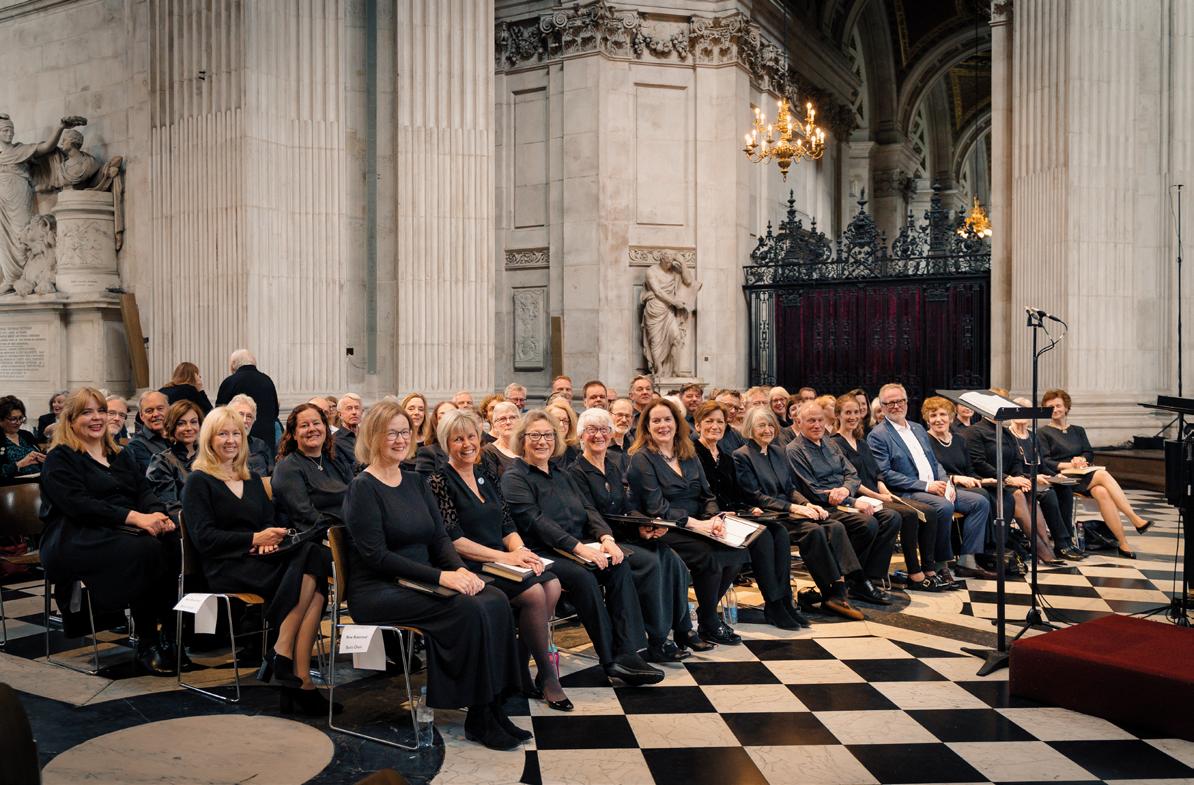
We appreciate all our philanthropic donors and supporters who believe in our vision and mission to transform lives in our East London community. This year, we want to highlight two funders who have made our ambition to create a brand-new Clinical Research Facility a reality. They’ve helped us achieve a significant milestone in our Barts 900 Campaign.
Historically, opportunities for patients in East London to take part in potentially lifesaving clinical trials have been limited. However, with the generous support of The Charles Wolfson Charitable Trust and The Wolfson Foundation –who have both pledged £1m – this is set to change.
The Clinical Research Facility is an ambitious plan. It will increase Barts Health’s clinical research capacity and infrastructure by creating a dedicated space for clinical trials. This will accelerate the development of innovative new therapies, bringing them closer to our community.
In December 2023, The Charles Wolfson Charitable Trust, a long-standing supporter of Barts Charity, pledged £1m to support the development of the Clinical Research Facility.
The Charitable Trust was drawn to support the project because of its potential to produce lifechanging treatments that could benefit our diverse population. This incredible pledge marked the first seven figure gift for the Barts 900 Campaign.
“When we were approached about the Clinical Research Facility, we could immediately see its potential to expand access to early-stage clinical research trials and support the growth of our local and national life sciences ecosystem. We are delighted to be working with the team at Barts Charity again and look forward to seeing how the Clinical Research Facility helps to drive innovation and new therapies.”
The Hon Andrew Wolfson, Chair of
The Charles Wolfson Charitable Trust
At the start of 2024, The Wolfson Foundation also awarded a transformative £1m towards the building costs of the new Clinical Research Facility. The Wolfson Foundation was particularly interested in how the facility will expand the range and scale of early phase clinical trials. Our partners, Barts Health and Queen Mary, will build on these and contribute to world-class innovations.
“ The Wolfson Foundation is delighted to support a project with the potential to make a significant contribution to better understand and treat a range of diseases. We are looking forward to seeing the progress of the Clinical Research Facility, and the early phase trials that it enables.”
Paul Ramsbottom, Chief Executive of The Wolfson Foundation
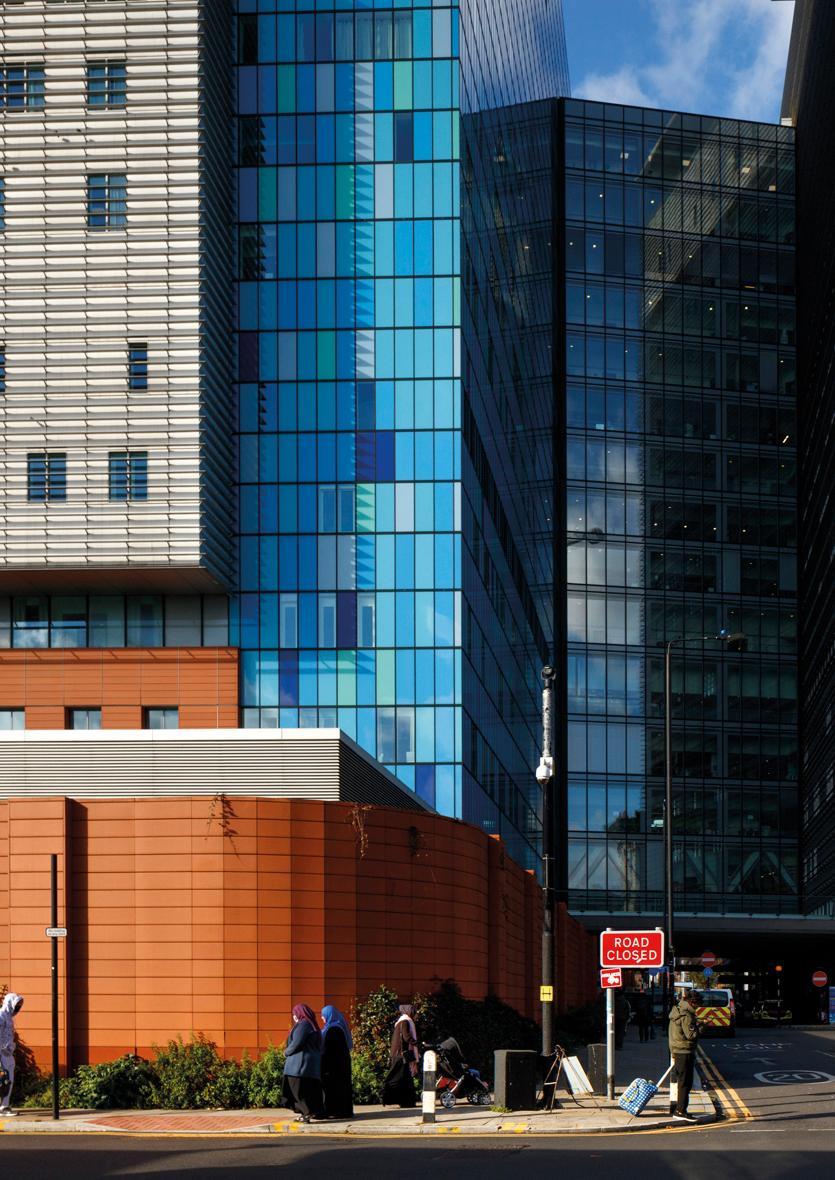
We are so grateful to everyone who has contributed to Barts Charity over the last year and beyond, from our community fundraisers to philanthropic supporters. Thank you to our individual and corporate supporters, trusts and foundations, and donors who want to remain anonymous. It’s thanks to all of your support and generosity that we have been able to create the impact you have read about in this report.
The Abed Family
The Alamouti Family
Andy Bruce
Bank of America
Bank of Montreal
The Bedford Road Charitable Fund
The Blyth Watson Charitable Trust
The Boparas
The Cadogan Charity
Capula Investment Management
Carter Lemons Camerons LLP
Charles Hoare Nairne
Charles Perrin CBE and Gillian Perrin
Charles S French Charitable Trust
The Charles Wolfson Charitable Trust
Chester Mojay-Sinclare
City Bridge Foundation
CME Group
Dalgleish Trust
EBM Charitable Trust
Fidelity
Garfield Weston Foundation
Gavin Williams
Goldman Sachs Gives
Goldman Sachs Gives
Nimesh Khiroya
The Heathside Charitable Trust
The John R Murray Charitable Trust
JPMorgan Chase
The J P Moulton Charitable Foundation
Kusuma Trust UK
Landesbank BadenWurttemberg
In Memory of Mary Reynolds
Michael Jacobson & Jonathon Ball
Monday Charitable Trust
NHS Charities Together
Ocorian Trustees
Paul Rawlinson
PF Charitable Trust
Qube Research & Technologies
Richard Buxton
Rockford Associates
Rosetrees Trust
The Rothermere Foundation
The Spectacle Makers’ Charity
Starr International Foundation
Sylvia Waddilove Foundation UK
Toronto Dominion Bank
In Memory of Vahab Samadian
The Wolfson Foundation
The Worshipful Company of Barbers
The Worshipful Company of Brewers
The Worshipful Company of Broderers
The Worshipful Company of Builder’s Merchants
The Worshipful Company of Dyers
The Worshipful Company of Environmental Cleaners, In Memory of Wendy Broadley
The Worshipful Company of Goldsmiths
The Worshipful Company of Gold & Silver Wyre Drawers
The Worshipful Company of International Bankers
The Worshipful Company of Leathersellers
The Worshipful Company of Parish Clerks
The Worshipful Company of Salters
The Worshipful Company of Tin Plate Workers Alias Wireworkers
The Worshipful Company of Turners
The Worshipful Company of Tylers & Bricklayers
The Worshipful Company of World Traders
ZVM Rangoonwala Foundation
We could not have achieved so much in the last year without the guidance of our experienced and engaged Trustees and Advisers. We feel very fortunate to have their support – which they give on a purely voluntary basis – and would like to extend our thanks for all they do.
Non-executives
Trustees
Andy Bruce, Chair
Sally Flanagan
Professor Catherine Godson
Ian Hart, Deputy Chair
Professor Dame Parveen Kumar (to 31 May 2024)
Dr Richard Lewis
Jean Murphy
Nimesh Patel
Dr Thomas Round
Adam Sharples (ex officio Trustee, Acting Chair of Barts Health NHS Trust) (from 5 July 2024)
Rt Hon Jacqui Smith (ex officio Trustee, Chair of Barts Health NHS Trust) (to 5 July 2024)
Dr Lorna Williamson OBE
Board Adviser
Moira Gitsham (communications) (to 30 September 2023)
Appointments and Remuneration Committee
Andy Bruce, Chair
Sally Flanagan
Ian Hart
Nimesh Patel (from 1 November 2023)
Finance and Audit Committee
Nimesh Patel, Chair
Ian Hart
Dr Richard Lewis
Mohammad Memon
Grants Committee
Dr Lorna Williamson OBE, Chair
Professor Mirela Delibegovic
Professor Adrian Dixon (to 30 September 2023)
Professor Catherine Godson
Professor Sarah Purdy OBE
Professor Kanchan Rege Thrasher
Dr Thomas Round
Dr Ultan McDermott
Investment Committee
Sally Flanagan, Chair
Andy Bruce
Philip Glaze
Ian Hart
Jean Murphy

